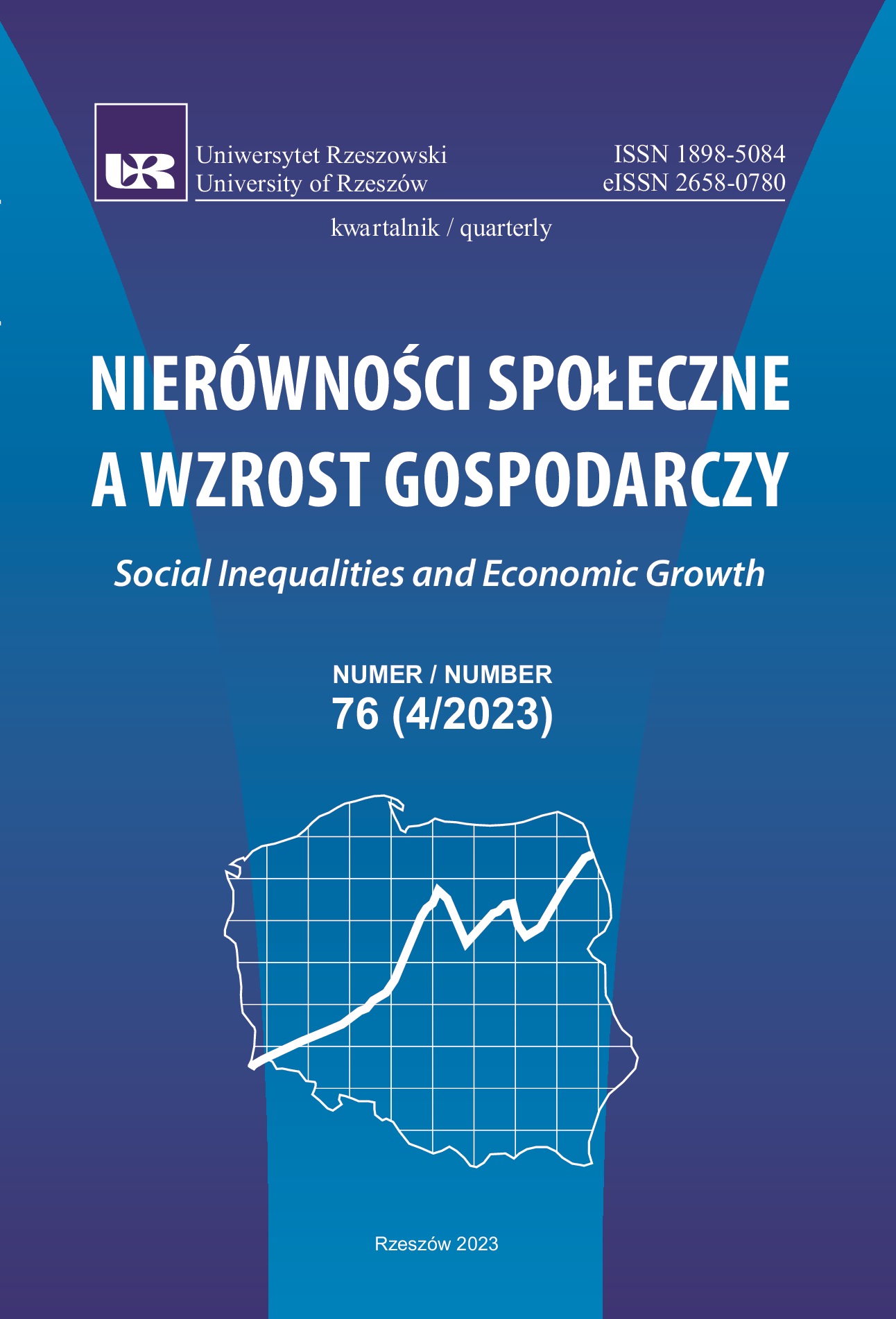Resilience inequalities in the European Union countries
DOI:
https://doi.org/10.15584/nsawg.2023.4.4Keywords:
resilience, economy development, European Union, crisisAbstract
The aim of the article is to identify groups of European Union countries characterized by a similar level of economic resilience in the period of numerous crisis situations and to identify the relationship between the level of economic resilience and the level of economic development, with particular emphasis on the situation in Poland. The hypothesis is that Poland is characterized by weak economic resilience, and the level of economic resilience’s EU countries is correlated with the level of economic development. The subject scope of the study concerns the level of economic resilience and the level of economic development. The subjective scope of the study covered the EU countries, excluding Luxembourg and Malta, within the year 2021. The article uses literature analysis and
a statistical research method. Each country of the EU has a different level of economic resilience. The highest level of economic resilience is found in the Nordic countries and the Netherlands. Poland belongs to the group of countries with the lowest level of resilience, but it is slightly higher in the case of aspects related to educational and financial resilience. Less resilient countries, such as Poland, may therefore find it more difficult to adapt to the European Commission's policy direction. The level of economic development of countries is strongly positively correlated with the level of their economic resilience (excluding the outlier observation – Ireland – the Pearson correlation coefficient between the economic resilience index and GDP per capita in PPP for 2021 was 0.883).
Downloads
References
Buczek, M., Wojtaszek, H. (2022). Analiza zmian organizacyjnych w sytuacjach kryzysowych. Management and Quality – Zarządzanie i Jakość, 4(4), 398–410.
Bugaj, J., Witek, A. (2022). Rezyliencja jako element modelu kompetencji menedżera do zarządzania kryzysem. Studia i Prace Kolegium Zarządzania i Finansów, 184, 9–19. DOI: 10.33119/SIP.2022.184.1.
Drobniak, A. (2022). Rezyliencja – dlaczego jej potrzebujemy? Serwis Rzeczypospolitej Polskiej. Pobrane z: https://www.gov.pl/web/wuf11/rezyliencja--dlaczego-jej-potrzebujemy (2023.09.01).
Elak, L., Chrząszcz, A., Żurawski, S., Urbańska, N. (2022). Wpływ wojny rosyjsko-ukraińskiej na bezpieczeństwo ekonomiczne Europy. Studia Społeczne, 4(39), 63–74.
Eurostat. Pobrane z: https://ec.europa.eu/eurostat/web/main/data/database (2023.12.11).
Hafele, J., Bertram, L., Demitry, N., Le Lannou, L.-A., Korinek, L., Barth, J. (2023). The Economic Resilience Index. ZOE Institute for Future-fit Economies. Pobrane z: https://zoe-institut.de/wp-content/uploads/2023/02/Economic_Resilience_Index_Final.pdf (2023.09.01).
Ingram, T., Bratnicka-Myśliwiec, K. (2019). Organizational Resilience of Family Businesses. Problemy Zarzadzania, 2/2019(82), 186–204. DOI: 10.7172/1644-9584.82.10.
Investing.com. Pobrane z: https://www.investing.com/ (2023.09.01).
Karman, A. (2019). Odporność organizacji na ekstrema pogodowe. Lublin: Wydawnictwo Uniwersytetu Marii Curie-Skłodowskiej.
Kończak, G., Trzpiot, G. (2008). Statystyka opisowa i matematyczna z arkuszem kalkulacyjnym Excel. Katowice: Wydawnictwo Akademii Ekonomicznej im. Karola Adamieckiego.
Ostárková, J., Staníčková, M. (2021). How well do we know the issue of resilience? Literary research of current levels of knowledge. Eastern Journal of European Studies, 12(Special issue), 12–42. DOI: 10.47743/ejes-2021-SI02.
Panek, T., Zwierzchowski, J. (2013). Statystyczne metody wielowymiarowej analizy porównawczej. Teoria i zastosowania. Warszawa: Oficyna Wydawnicza Szkoła Główna Handlowa w Warszawie.
Portuguez Castro, M., Gómez Zermeño, M.G. (2021). Being an entrepreneur post- COVID-19 – resilience in times of crisis: A systematic literature review. Journal of Entrepreneurship in Emerging Economies, 13(4), 721–746. DOI: 10.1108/JEEE-07-2020-0246.
Salisu, I., Hashim, N., Mashi, M.S., Aliyu, H.G. (2020). Perseverance of effort and consistency of interest for entrepreneurial career success: Does resilience matter? Journal of Entrepreneurship in Emerging Economies, 12(2), 279–304. DOI: 10.1108/JEEE-02-2019-0025.
Sari, P.A., Sari, W.P., Rinaldo, D. (2022). Business performance during the COVID-19 crisis: A major contribution of entrepreneurial resilience. Studia z Polityki Publicznej, 9(2(34)), 63–82. DOI: 10.33119/KSzPP/2022.2.4.
Stępka, M. (2021). W poszukiwaniu odpowiedzi na współczesne kryzysy. Ewolucja rezyliencji w polskim dyskursie strategicznym (2007–2020). Rocznik Instytutu Europy Środkowo-Wschodniej, 19(1), 43–63. DOI: 10.36874/RIESW.2021.1.2.
Szczuciński, P. (2021). Metody taksonomiczne w badaniu podobieństwa województwa lubuskiego do innych regionów Unii Europejskiej. Nierówności Społeczne a Wzrost Gospodarczy, 65(1), 124–137. DOI: 10.15584/nsawg.2021.1.7.
The World Bank Data. Pobrane z: https://data.worldbank.org/indicator (2023.09.25).
Wiercioch, M., Buk, H. (2022). Wpływ pandemii COVID-19 na poziom wykluczenia finansowego mieszkańców południowo-wschodniego regionu Polski. Nierówności Społeczne a Wzrost Gospodarczy, 71(3), 80–95. DOI: 10.15584/nsawg.2022.3.5.
Zapłata, S., Wiśniewski, M. (2022). Rola i miejsce zarządzania jakością w strukturze odporności organizacyjnej – studium przypadku. Management and Quality – Zarządzanie i Jakość, 4(2), 412–429.
Zioło, Z. (2022). Wpływ pandemii na zmiany zachowań podmiotów gospodarczych. Studies of the Industrial Geography Commission of the Polish Geographical Society, 36(2), 7–26. DOI: 10.24917/20801653.362.1.
Zioło, Z. (2023). Wpływ kryzysów na zmiany uwarunkowań funkcjonowania i rozwoju działalności gospodarczej. Studies of the Industrial Geography Commission of the Polish Geographical Society, 37(1), 7–25. DOI: 10.24917/20801653.371.1.
Strategic Foresight Report (2020). Komisja Europejska. Pobrane z: https://commission.europa.eu/strategy-and-policy/strategic-planning/strategic-foresight/2020-strategic-foresight-report_en (2023.09.01).
Downloads
Published
How to Cite
Issue
Section
License
Copyright (c) 2023 University of Rzeszow

This work is licensed under a Creative Commons Attribution-ShareAlike 4.0 International License.


